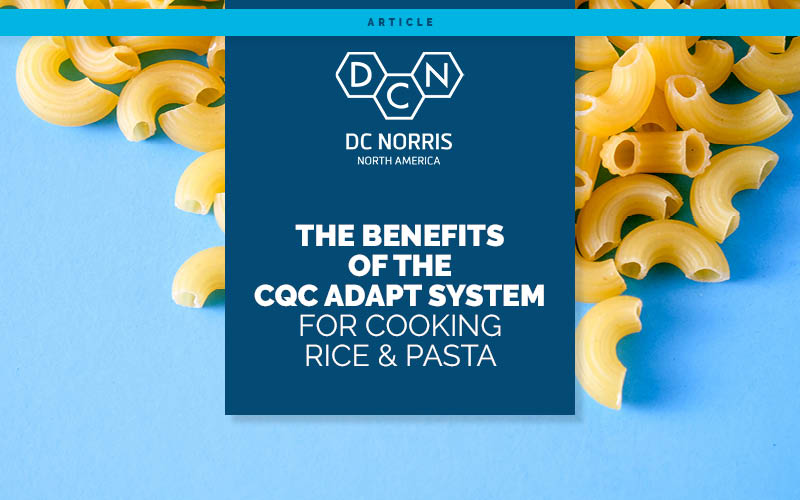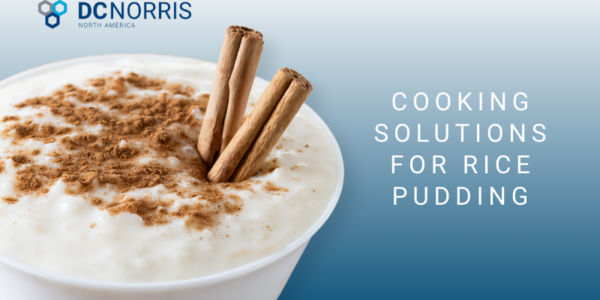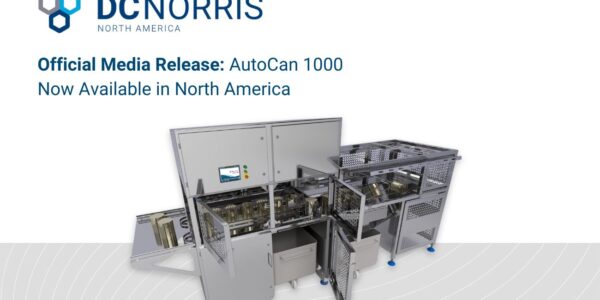The Benefits of the CQC Adapt System for Cooking Rice & Pasta
Al dente is the goal when it comes to cooking pasta, but as many food producers know when you’re batch cooking rice, pasta, and other high-starch foods, that goal isn’t easy to achieve. Plagued with clumping and product damage, cooking rice and pasta to perfection is a challenge for food manufacturers. Fortunately, eliminating clumping is one of the many benefits of the CQC Adapt.
Developed and released in early 2021, the DC Norris CQC (Cook Quench Chill) Adapt system brings highly valuable advances to the CQC equipment market and to manufacturers who cook rice, pasta, potatoes, and vegetables.
What is the CQC Adapt System?
The CQC (Cook Quench Chill) Adapt System is a modular 3-stage system designed to rapidly cook, quench and then rapidly chill rice, pasta, potatoes, and vegetables. The CQC Adapt moves food through a linear series of vessels to complete each phase. The food product is contained in baskets that are tipped into each other for the cooking, quenching, and cooling phase using an integrated hydraulic Euro Bin tipping unit.
Adapt System Phases
- Phase 1 – Product Loading
The integrated hydraulic Euro Bin tipping unit prepares for the Cook Position. The tipping unit can be lowered to operator level for product loading, and raised for loading into baskets.
- Phase 2 – Cook
Using our integrated Jet Cook™ technology, product is cooked quickly and evenly, achieving 100% energy into the water. The variable flow wave agitation system ensures even cooking and removes clumping issues.
- Phase 3 – Quench
The quench vessel is loaded with cold water to stop the cooking process and to rinse/wash the product before the chilling phase.
- Phase 4 – Chill
The chill vessel rapidly reduces the product temperature to below 37 °F. The chill vessel is initially filled with cold water from the mains and the temperature is lowered by circulating through a heat exchanger.
- Phase 5 – Unloading
The CQC Adapt system uses a stainless steel vibratory de-watering conveyor to drain water from the product before discharging it into a standard tote bin or product trays.
These CQC Adapt Features Prevent Damage & Clumping When Cooking Rice & Pasta
Integrated Jet Cook™ Direct Heat Steam System
Jet Cook™ water heating dramatically speeds up processing and cleaning times. Jet Cook™ operates by collapsing steam into the product at high velocity through a specially designed nozzle. As the steam collapses it pulls the product (liquid) through, creating a recirculating effect (partial vacuum) in the re-circulating pipe. 99.5% of the steam is utilized and then collapsed into the product ensuring huge energy savings. Jet Cook™ replaces Heat Exchangers which can scale over time extending heat-up times.
Unlike other CQC systems that heat to peak temperature before adding the food product, the CQC Adapt heats water initially to only 176°F for delicate pasta cooking, like linguine. Once the initial temperature is reached, the product is dropped into the cook tank and our patented Jet Cook™ units rapidly heat and agitate the water to 208°F in under 10 minutes. This along with our controllable weir system ensures zero clumping and even cooking.
Variable Wave Agitation System
The Variable Wave Agitation System pumps hot water from the cook tank through to the wave nozzles positioned at the rear of the cooking basket. Through the Recipe Manager software package, the speed of agitation can be controlled and adjusted. This feature reduces both clumping and product damage.
Cook Quench Chill Adapt Benefits
Designed as a linear, modular system – the CQC Adapt is easy to install and modify (adding and removing vessels quickly and safely to increase or decrease throughput). Offering variable water levels creates substantial water savings and the incorporation of Jet Cook™ dramatically speeds cooking and cleaning times for substantial energy savings.
Learn More About This System
Our experts are happy to help you explore the power and potential of the CQC Adapt System. Request a call back via our contact form.



